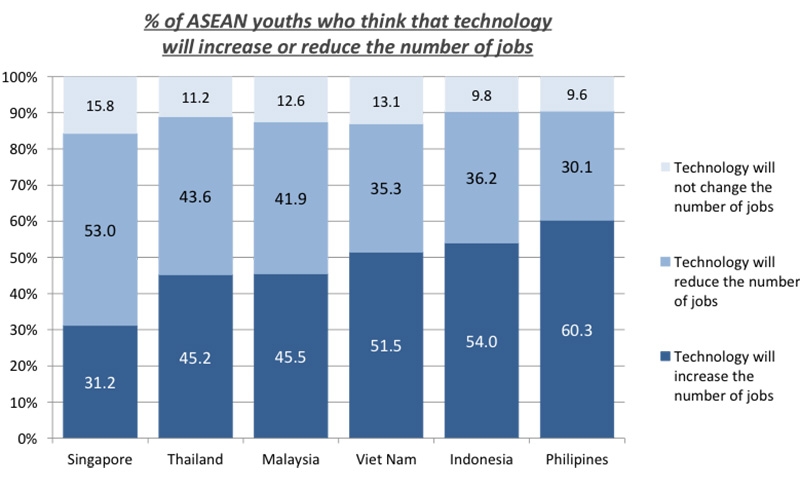Shaping future of Vietnam’s labour
 |
| The Vietnamese youth is optimistic about the changes Industry 4.0 will bring, Photo: Le Toan |
 |
| Source: World Economic Forum and Sea, one of Southeast Asia’s leading internet companies |
Last weeks’ visit to Vietnam by Klaus Schwab, founder and executive chairman of the World Economic Forum (WEF), was quite special. He came to the country with a big gift, a great deal of novel ideas for Vietnam to go forwards sustainably within the unfolding Fourth Industrial Revolution.
The gift was the Vietnamese-language version of his world-famous book titled “Shaping the Fourth Industrial Revolution,” which has already been translated into 29 languages.
“Shaping the Fourth Industrial Revolution” draws on contributions by more than 200 of the world’s leading technological, economic, and sociological experts to present a practical guide for citizens, business leaders, social influencers, and policy-makers.
It outlines the most important dynamics of today’s
technological revolution, highlights important stakeholders that are often overlooked in discussions of the latest scientific breakthroughs, and dives into 12 different technological areas that are key to the future of humanity.
“I don’t want to see Vietnam miss its Industry 4.0 opportunities, and you will be the very drivers of Vietnam’s future, which everyone wants to see continuing to be bright,” Schwab told the Open Forum ASEAN, part of the WEF on ASEAN 2018 event held last week in Hanoi.
The Open Forum ASEAN was partaken in by more than 1,000 people, including hundreds of students from several universities in Hanoi.
“I would like to tell you that Vietnam will miss its train to Industry 4.0 if its people and its businesses fail to improve themselves with knowledge of the ongoing digital technology revolution,” Schwab said.
Future of employment
Nguyen Thanh Binh from the University of Transport and Communications was one of the students at the event. In addition to his studies, he also works as a waiter at a restaurant near his university to earn money to take an English class and a class on design using digital technologies.
“I don’t want to be unemployed after graduation, and all parts of transport projects have begun to apply digital solutions,” Binh told VIR. “I have to prepare for my future. I don’t want to earn a living as my parents are doing, working on a rice field just to earn enough to survive.”
According to the World Bank, Vietnam’s shift from a centrally planned to a market economy has transformed the country from one of the poorest in the world into a lower middle-income country. Vietnam is now one of the most dynamic emerging countries in East Asia.
Vietnam is experiencing rapid demographic and social change. After years of growth, the population reached about 95 million in 2017 (up from about 60 million in 1986) and is expected to expand to 120 million before tailing off around 2050. Currently, 70 per cent of the population is under 35 years of age, with a life expectancy of close to 73 years. There is an emerging middle class, currently accounting for 13 per cent of the population, but expected to reach 26 per cent by 2026.
However, in the labour market, the International Labour Organization forecasts that 56 per cent of all employment in Cambodia, Indonesia, the Philippines, Thailand, and Vietnam is at high risk of being replaced by technology over the next decade or two.
“Over the past two decades, Vietnam has successfully inserted itself into select global value chains while achieving a remarkable reduction in poverty. In the years ahead, disruptive technologies will present both challenges and opportunities for remaining on this successful trajectory,” said Ousmane Dione, the World Bank’s country director for Vietnam.
Currently, about 1.6 million people enter the domestic labour market each year, creating a major burden for the government in trying to provide sufficient employment for its citizens. This burden is expected to grow further with Industry 4.0 rising on, as robots and high technologies are believed to replace a great deal of workers, especially manual labourers.
“The Fourth Industrial Revolution is changing everything – from the way we relate to one another, to the way our economies work, to what it means to be human. We cannot let the brave new world that technology is creating simply happen. We must shape a future we want to live in,” Schwab said.
Binh said he felt worried by what Schwab was talking about, because even though he is preparing for his future, he does not know for sure whether he will be able to apply what he has learned to his future work.
At the WEF on ASEAN, the WEF also launched a survey on how technology will impact the ASEAN’s youth like Binh. 64,000 ASEAN citizens responded, including more than 11,000 from Vietnam.
Results showed that 51.5 per cent of Vietnamese youth believe that technology will increase the number of jobs, which is lower than the rates of 54 per cent in Indonesia and 60.3 per cent in the Philippines. However, it is also higher than the 45.5 per cent in Malaysia, the 45.2 per cent in Thailand, and the 31.2 per cent in Singapore (see box for details).
“Fourth Industrial Revolution technologies like artificial intelligence, advanced robotics, and self-driving vehicles will bring significant disruption to the job market,” said Justin Wood, head of Asia-Pacific and member of the executive committee at the WEF.
“No one knows yet what impact these technologies will have on jobs and salaries. Globally, there is concern that technological change may bring rising inequality and joblessness. But in the ASEAN, the sentiment seems to be much more positive,” he said.
More investment into human resources needed
“Vietnam must invest now in skills and health for the workforce of the future,” said the World Bank’s Dione.
In 1999, the US Department of Labor predicted that 65 per cent of primary school children would end up in jobs that had not been invented at the time. Last year, this number jumped to 85 per cent, according to Dell Technologies.
“We are looking at an unknown job landscape in the future. In human capital terms, Vietnam is well positioned. It has achieved good basic education outcomes, reflected through its strong results in international assessments such as PISA and Young Lives, and it has a dynamic young generation that can embrace and adapt to changes. Also, Vietnam ranks seventh in terms of improvements to its universal health coverage score,” Dione said.
However, according to him, the country is ageing. The share of Vietnam’s population at working age peaked last year, and is now on a decline. By 2050, it is expected that one out of every five Vietnamese people will be over 65 years old. A critical challenge in Vietnam is that only 8 per cent of the labour force has university education, and this is insufficient to make the leap into Industry 4.0. Workers need to be equipped with the right skill mix to ride the wave.
“In order to stay ahead and embrace shifts in innovation, promoting digital literacy is important. This includes the existing public sector workforce, so it can respond to emerging digital demands,” Dione said.
“In many cases, this will require a change in mindset and a departure from comfort zones. Partnering with the private sector and citizens to leverage their participation, creativity, and innovation in public services will be useful to help the public sector workforce keep up with the digital pace,” he said.
As an example, China has been able to move forward with transformative digital health services that can improve access to, and the quality of, healthcare. This is made possible by plentiful domestic venture capital resources of $5-10 billion, promising IPO valuations, and the power of the public sector to integrate innovations quickly into service delivery models.
These digital health service initiatives include the Robot, a telemedicine system that aims to boost the appropriateness of care at village-level clinic in Anhui, or the WeDoctor platform that provides online access to health professionals and allows bookings for face-to-face appointments.
Student Binh from the University of Transport and Communications expects that Dione’s words and Schwab’s book should be heeded and translated into actions.
“I don’t want to be a burden to society after graduation. Young people like me want to be a strong wheel for the economy’s train heading towards Industry 4.0,” Binh said.
What the stars mean:
★ Poor ★ ★ Promising ★★★ Good ★★★★ Very good ★★★★★ Exceptional
Related Contents
Latest News
More News
- EU and Vietnam elevate relations to a comprehensive strategic partnership (January 29, 2026 | 15:22)
- Vietnam to lead trade growth in ASEAN (January 29, 2026 | 15:08)
- Japanese business outlook in Vietnam turns more optimistic (January 28, 2026 | 09:54)
- Foreign leaders extend congratulations to Party General Secretary To Lam (January 25, 2026 | 10:01)
- 14th National Party Congress wraps up with success (January 25, 2026 | 09:49)
- Congratulations from VFF Central Committee's int’l partners to 14th National Party Congress (January 25, 2026 | 09:46)
- 14th Party Central Committee unanimously elects To Lam as General Secretary (January 23, 2026 | 16:22)
- Worldwide congratulations underscore confidence in Vietnam’s 14th Party Congress (January 23, 2026 | 09:02)
- Political parties, organisations, int’l friends send congratulations to 14th National Party Congress (January 22, 2026 | 09:33)
- Press release on second working day of 14th National Party Congress (January 22, 2026 | 09:19)

 Tag:
Tag:




















 Mobile Version
Mobile Version